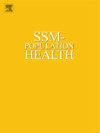Income rank and life satisfaction: Examining the relationship with wealth inequality among middle-aged and older indian adults
IF 3.6
2区 医学
Q1 PUBLIC, ENVIRONMENTAL & OCCUPATIONAL HEALTH
引用次数: 0
Abstract
The relationship between income and subjective well-being (SWB) has intrigued scholars for decades. Richard Easterlin’s groundbreaking research in the 1970s revealed a paradox: while higher individual incomes within countries are associated with greater happiness, this trend does not hold across countries. This paradox highlights the significance of relative income over absolute income. Subsequent research has consistently demonstrated that relative income, or one’s income rank compared to others, has a more substantial impact on happiness than absolute income. Studies across various contexts have corroborated this finding, emphasizing the importance of social comparisons and status. This study investigates how wealth inequality moderates the association between income rank and life satisfaction in India. Utilizing data from the Longitudinal Ageing Survey of India (LASI), we examine how regional wealth inequality influences the relationship between income rank and well-being. Our analysis reveals that higher relative rank is associated with increased life satisfaction, while greater wealth inequality diminishes it. The interaction between income rank and wealth inequality is significant, indicating that relative income matters more in highly unequal regions. India’s vast economic growth and rising inequality make it a crucial case for understanding global inequality dynamics. Our findings suggest that in regions with higher wealth inequality, the association between relative rank on life satisfaction is magnified, highlighting the importance of social comparisons in well-being assessments. This research contributes to the broader discourse on income, inequality, and well-being, offering insights into a non-WEIRD (Western, Educated, Industrialized, Rich, and Democratic) context and emphasizing the relevance of relative rank in shaping life satisfaction.
收入等级和生活满意度:考察印度中老年成年人与财富不平等的关系。
几十年来,收入与主观幸福感(SWB)之间的关系一直引起学者们的兴趣。理查德·伊斯特林(Richard Easterlin)在上世纪70年代进行的开创性研究揭示了一个悖论:虽然一个国家内个人收入越高,幸福感越高,但这种趋势并不适用于所有国家。这一悖论凸显了相对收入相对于绝对收入的重要性。随后的研究一致表明,相对收入,或者一个人的收入与其他人相比,对幸福的影响比绝对收入更大。不同背景下的研究证实了这一发现,强调了社会比较和地位的重要性。本研究探讨财富不平等如何调节印度收入等级和生活满意度之间的关系。利用印度纵向老龄化调查(LASI)的数据,我们研究了区域财富不平等如何影响收入等级与幸福感之间的关系。我们的分析表明,较高的相对排名与生活满意度的提高有关,而更大的财富不平等则会降低生活满意度。收入等级和财富不平等之间的相互作用是显著的,这表明相对收入在高度不平等的地区更为重要。印度巨大的经济增长和日益加剧的不平等,使其成为理解全球不平等动态的关键案例。我们的研究结果表明,在财富不平等程度较高的地区,相对排名与生活满意度之间的关联被放大了,这突出了社会比较在幸福感评估中的重要性。这项研究有助于对收入、不平等和福祉进行更广泛的讨论,提供了对非weird(西方、受过教育、工业化、富裕和民主)背景的见解,并强调了相对等级在塑造生活满意度方面的相关性。
本文章由计算机程序翻译,如有差异,请以英文原文为准。
求助全文
约1分钟内获得全文
求助全文
来源期刊

Ssm-Population Health
PUBLIC, ENVIRONMENTAL & OCCUPATIONAL HEALTH-
CiteScore
6.50
自引率
2.10%
发文量
298
审稿时长
101 days
期刊介绍:
SSM - Population Health. The new online only, open access, peer reviewed journal in all areas relating Social Science research to population health. SSM - Population Health shares the same Editors-in Chief and general approach to manuscripts as its sister journal, Social Science & Medicine. The journal takes a broad approach to the field especially welcoming interdisciplinary papers from across the Social Sciences and allied areas. SSM - Population Health offers an alternative outlet for work which might not be considered, or is classed as ''out of scope'' elsewhere, and prioritizes fast peer review and publication to the benefit of authors and readers. The journal welcomes all types of paper from traditional primary research articles, replication studies, short communications, methodological studies, instrument validation, opinion pieces, literature reviews, etc. SSM - Population Health also offers the opportunity to publish special issues or sections to reflect current interest and research in topical or developing areas. The journal fully supports authors wanting to present their research in an innovative fashion though the use of multimedia formats.
 求助内容:
求助内容: 应助结果提醒方式:
应助结果提醒方式:


